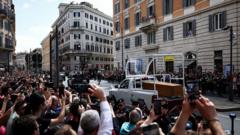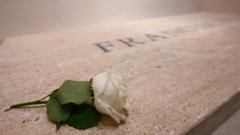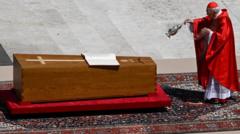In the wake of Pope Francis's passing, cardinals are gathering in Rome for vital discussions to determine the Church's next leader, with a focus on key issues and candidates.
Pope Francis Funeral Sparks Cardinal Meetings: A New Pope in the Making

Pope Francis Funeral Sparks Cardinal Meetings: A New Pope in the Making
As the world mourns Pope Francis, cardinals convene to discuss the future leadership of the Catholic Church.
On the heels of Pope Francis's funeral attended by hundreds of thousands, the Roman Catholic Church is bracing itself for a pivotal week as cardinals gather for important meetings. These discussions, indicative of the shifting tides within the Church, will help identify potential successors—those deemed "papabili," or popes-in-waiting.
The gatherings began shortly after Pope Francis's death, but will intensify this week, paving the way toward the next conclave where the new pope will be elected. These sessions, known as general congregations, offer an opportunity for cardinals, particularly those under 80 who possess voting rights, to connect, assess priorities, and evaluate each other's charisma and appeal.
Traditionally, the art of "papal campaigning" is avoided; an unspoken rule dictates that self-promotion and overt politicking should be sidestepped in favor of organic support. Experts note that while some cardinals may indeed enter the conclave as leading contenders, the key to success often lies in humility and authenticity.
Reflecting on past elections, Cardinal Joseph Ratzinger's powerful eulogy for Pope John Paul II in 2005 propelled him into the papacy as Benedict XVI, a testament to the impact of a resonant message. This time around, the focus will be on articulating a vision for a modern Church that can engage with the complexities of today’s world while remaining steadfast in its core values.
As this week unfolds, all eyes will be on the cardinal meetings, hoping for leadership that can guide the Catholic Church into a new era.
The gatherings began shortly after Pope Francis's death, but will intensify this week, paving the way toward the next conclave where the new pope will be elected. These sessions, known as general congregations, offer an opportunity for cardinals, particularly those under 80 who possess voting rights, to connect, assess priorities, and evaluate each other's charisma and appeal.
Traditionally, the art of "papal campaigning" is avoided; an unspoken rule dictates that self-promotion and overt politicking should be sidestepped in favor of organic support. Experts note that while some cardinals may indeed enter the conclave as leading contenders, the key to success often lies in humility and authenticity.
Reflecting on past elections, Cardinal Joseph Ratzinger's powerful eulogy for Pope John Paul II in 2005 propelled him into the papacy as Benedict XVI, a testament to the impact of a resonant message. This time around, the focus will be on articulating a vision for a modern Church that can engage with the complexities of today’s world while remaining steadfast in its core values.
As this week unfolds, all eyes will be on the cardinal meetings, hoping for leadership that can guide the Catholic Church into a new era.


















